Medically review by Kim Langdon
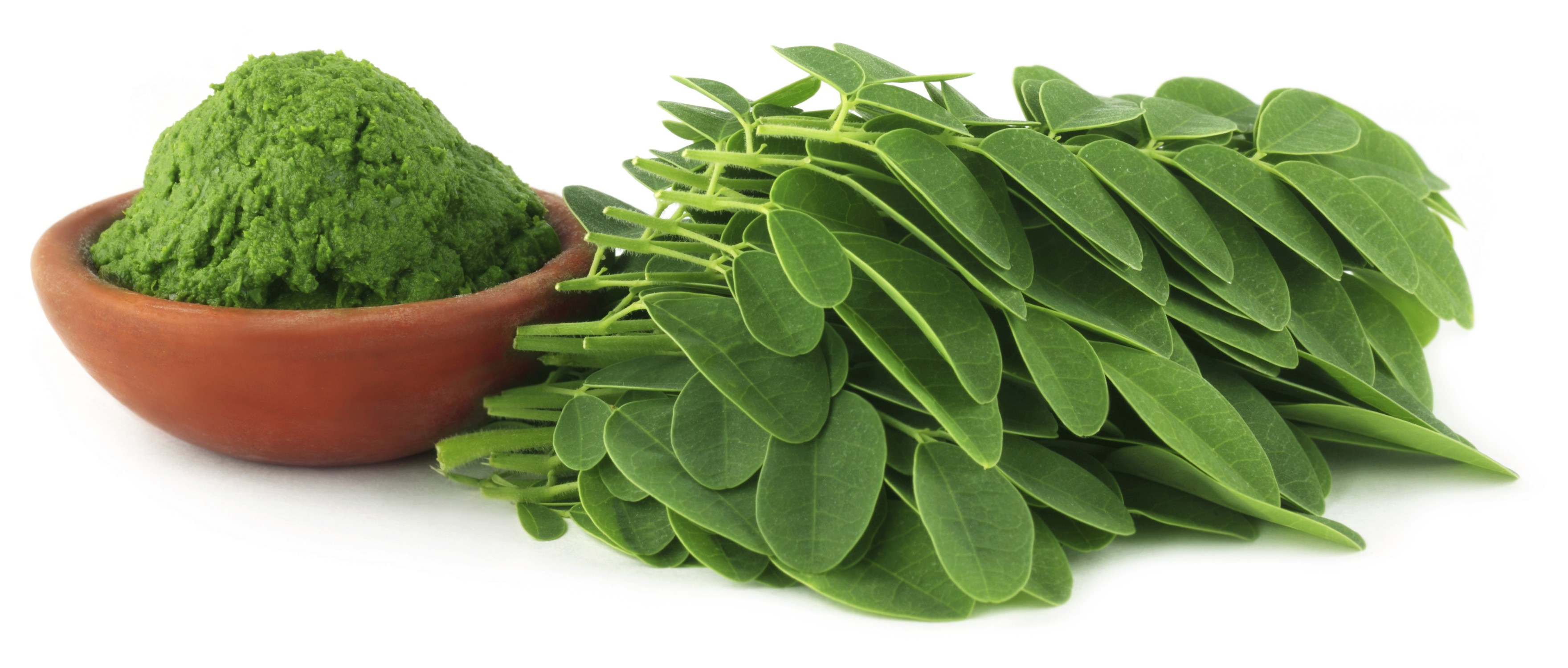
What is Moringa?
Moringa oleifera is a traditional Ayurvedic (whole-body) medicine that has been used to treat and prevent a variety of diseases.
It is often used in countries and areas where nutrition and access to healthy food is compromised because it's a nutritional powerhouse. If you don't love eating your greens, keep on reading!
Also called: Drumstick Tree, Ben Oil Tree, Horseradish Tree, Miracle Tree, Mother's Best Friend, and Never Die.
Sounds a bit like a modern miracle and it might just be.
Never heard of it? That's okay.
Despite being around for many years, new research is just emerging on the benefits of moringa and we're here to tell you all about 'em.
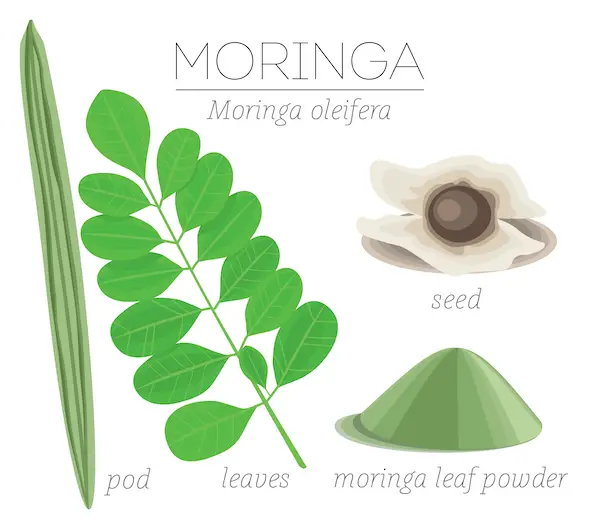
Nutrition
Nearly every part of this tree can be consumed in order to reap the benefits of its nutrition.
While this plant is most commonly sold in capsule form to take as a supplement, moringa benefits are most potent when eaten whole.
One cup of its leaves contains:
- Protein: 2 grams.
- Vitamin B6: 19% of the RDA.
- Vitamin C: 12% of the RDA.
- Iron: 11% of the RDA.
- Riboflavin (B2): 11% of the RDA.
- Vitamin A (from beta-carotene): 9% of the RDA.
- Magnesium: 8% of the RDA.
Antioxidants?
Antioxidants are chemicals that prevent and slow cell damage.
The most common sources are vitamins A, C, and E, beta-carotene, and lycopene, some of which are found in moringa.
In addition to the big ones, moringa contains:
- Quercetin: This antioxidant has been shown to potentially lower blood pressure
- Chlorogenic acid: This stuff, also found in coffee, may help moderate blood sugar levels after meals
When used consistently, the moringa supplement has been proven to increase antioxidant levels.
One study in particular concluded that postmenopausal women found taking seven grams of moringa leaf powder every day for three months had higher blood antioxidant levels.
Powerful stuff, huh?
Anti-Inflammatory
We know that a real food diet is overall used to lessen inflammation in the body which can be helpful for chronic pain, autoimmune disease, and bloating.
One of the benefits of moringa is its anti-inflammatory properties.
In animal studies, moringa oleifera has been shown to reduce inflammation which could be attributed to its isothiocyanates which are also protective against cancer.
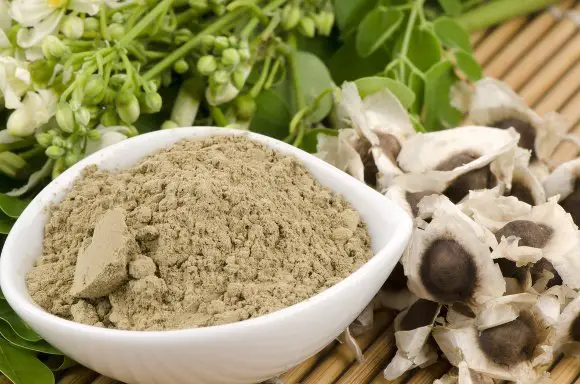
Lowering Cholesterol
High cholesterol is linked to higher risk for heart disease and heart attack. Many plant foods have been shown to reduce "bad" cholesterol and moringa is no exception.
Studies on both animals and humans have shown that moringa uses include definite hypocholesterolemic activity which overall reduces risk of heart disease.
Blood Sugar Management
In one study, women who took seven grams of moringa leaf powder every day for three months reduced their fasting blood sugar levels by 13.5%.
Although this study is small, it shows promising evidence that the benefits of moringa can be very powerful.
Even more convincing is that in another study, six diabetic patients found that adding 50 grams of Moringa leaves to a meal reduced the rise in blood sugar by 21%.
In the future with more conclusive evidence, the moringa supplement could be widely used to treat diabetes or even just the dreaded blood sugar rise and fall we all face from time to time.
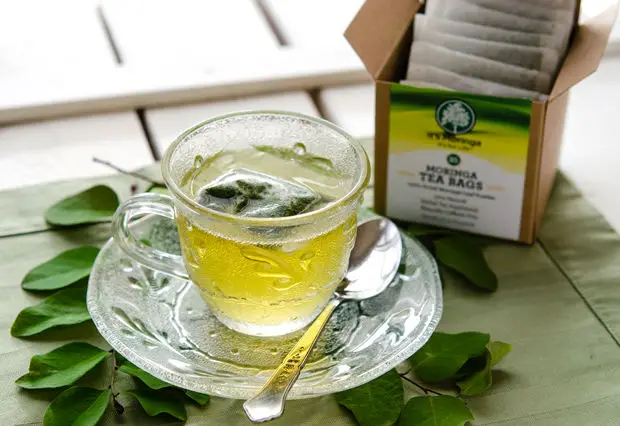
Ways to Use Moringa in Your Everyday Life
You can use the leaves, the pod, and the powdered supplement in a variety of ways making moringa accessible and easy to use daily.
- Moringa tea. You can brew the leaves much like many herbs and supplements into a hot, healing beverage. Moringa tea benefits include antioxidants, and anti-inflammatory boost, and loads of nutrition. Bonus? No caffeine!
- As a green. You can cook the fresh leaves of moringa much like spinach.
- As a pod. You can cook the pods of moringa like you would green beans and snap peas.
- Water purifier. Moringa can be used to separate solids from liquids which can purify water. You can read about the process here.
- Moringa powder. The powder can be mixed into liquids, taken under the tongue with water, sprinkled on food, or used in cooking at low temperatures so as not to destroy the nutrition.
Overall, the benefits of moringa are still being studied in both humans and animals.
Final Thoughts About Moringa
In the meantime, it might be worth it to pick some up! We do know for certain that it is a nutritional powerhouse loaded with vitamins, minerals, and antioxidants and that it does have anti-inflammatory properties.
While this superfood is no "cure-all," it certainly has healing properties and has been used as medicine for many years.
This article was fact checked for accuracy by Dr. Kim Langdon, MD. As always, this is not personal medical advice and we recommend that you talk with your doctor.
References
Like this article? Share it or PIN from here.
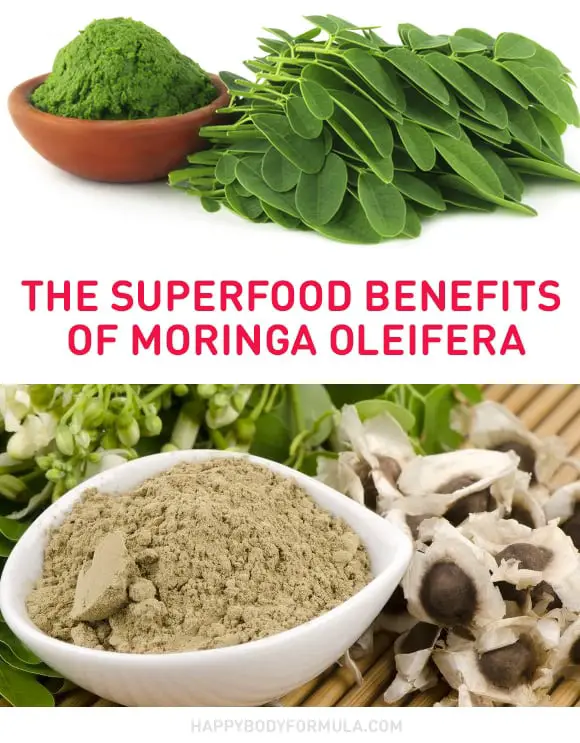
Kimberly Langdon M.D. is a retired University-trained obstetrician/gynecologist with 19-years of clinical experience. She delivered over 2000 babies to mothers in a suburban Midwestern community.

